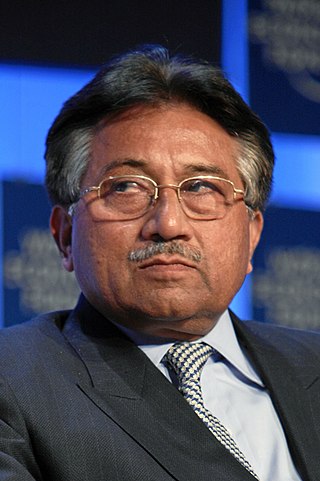
Pervez Musharraf was a Pakistani military officer and politician who served as the tenth president of Pakistan from 2001 to 2008.

The prime minister of Pakistan is the head of government of the Islamic Republic of Pakistan. Executive authority is vested in the prime minister and his chosen cabinet, despite the president of Pakistan serving as the nominal head of executive. The prime minister is often the leader of the party or the coalition with a majority in the lower house of the Parliament of Pakistan, the National Assembly where he serves as Leader of the House. Prime minister holds office by virtue of their ability to command the confidence of the National Assembly. The prime minister is designated as the "chief executive of the Islamic Republic".

Chaudhry Shujaat Hussain is a senior Pakistani politician who previously served as 16th prime minister of Pakistan. Hussain is the party president of the Pakistan Muslim League (Q) since 2003.

Shaukat Aziz is a Pakistani former banker and financier who served as 15th Prime Minister of Pakistan from 28 August 2004 to 15 November 2007, as well as the finance minister of Pakistan from 6 November 1999 to 27 August 2004. He studied at St Patrick's High School, Karachi. Aziz graduated from the Institute of Business Administration in Karachi, and joined the corporate staff of the CitiBank Pakistan in 1969. He served in various countries' governments as CitiBank financier, and became executive vice-president of Citibank in 1999. After accepting a personal request by General Pervez Musharraf, Aziz returned to Pakistan from the United States to assume charge of the Finance Ministry as the finance minister while taking control of the country's economy. In 2004, Aziz was nominated by the Musharraf loyalist government, led by Pakistan Muslim League (Q), for the position of prime minister after the resignation of Zafarullah Khan Jamali on 6 June 2004.

The National Security Council is a federal institutional and consultative body chaired by the prime minister of Pakistan as its chairman. The NSC is a principal forum that is mandated for considering national security and foreign policy matters with the senior national security advisers and Cabinet ministers. The idea and inception of National Security Council was first conceived in 1969 under the President Yahya Khan, its functions were to advise and assist the president and prime minister on national security and foreign policies.

Humayun Akhtar Khan is a Pakistani politician, business tycoon and actuary. He has been elected as a member of the National Assembly four consecutive times between 1990 and 2007, having served as Federal Minister for Trade and Commerce from 2002 to 2007 and as Chairman Board of Investment / Minister of State for Investment from 1997 to 1999.

Omar Ayub Khan is a Pakistani politician who is currently serving as the Leader of the Opposition. He was the last Federal Minister for Economic Affairs under the Prime Ministership of Imran Khan from April 2021 until April 2022. He previously served as Federal Minister for Energy from 11 September 2018 to 16 April 2021. He had been a member of the National Assembly of Pakistan from August 2018 till January 2023. He is the grandson of the former President of Pakistan, Field Marshal Ayub Khan and the son of Gohar Ayub Khan, who was also a politician. Previously, he served as a member of the National Assembly from 2002 to 2007 and again from 2014 to 2015. He also served as the Minister of State for Finance in the federal cabinet from 2004 to 2007. He has served as Secretary General of Pakistan Tehreek-e-Insaf since he assumed the role on 27 May 2023. He resigned from the position on 4 September 2024 and his resignation was accepted by Imran Khan on 7 September.
Shaukat Khanum Memorial Cancer Hospital and Research Centre (SKMCH&RC) is a cancer centre with locations in Lahore and Peshawar, Pakistan. SKMCH&RC Lahore was the first project of the Shaukat Khanum Memorial Trust, the second one being SKMCH&RC Peshawar.
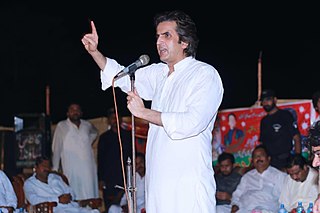
Makhdum Khusro Bakhtyar is a Pakistani politician who recently served as Pakistan's Federal Minister for Industries & Production. Previously, he has served as Federal Minister of Economic Affairs, Federal Minister of National Food Security and Research and Federal Minister for Planning, Development and Reforms in the PTI Government under the leadership of Prime Minister Imran Khan. He had been a member of the National Assembly of Pakistan from 2002 to 2008, 2013 to 2018 and 2018 till 2023.
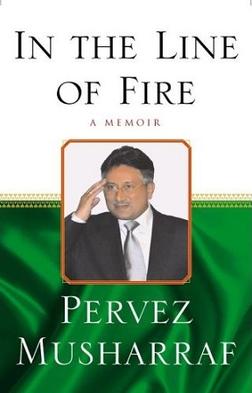
In the Line of Fire: A Memoir is a book that was written by former President of Pakistan Pervez Musharraf and first published on September 25, 2006. The book contains a collection of Musharraf's memories and is being marketed as his official autobiography.
Events from the year 2005 in Pakistan.
Events from the year 2006 in Pakistan.

Hina Rabbani Khar is a Pakistani politician, who served as the Minister of State for Foreign Affairs since 19 April 2022 till 10 August 2023. She was previously appointed in July 2011 as the Foreign Minister of Pakistan, she was the first woman to have held the position. Khar had been a member of the National Assembly from August 2018 to August 2023.

Lieutenant-General Jamshed Gulzar Kiani, HI(M), SJ, SBt, TJ, was a three-star rank army general in the Pakistan Army, intelligence officer and the former Colonel Commandant of the Baloch Regiment and commander of X Corps.

Babar Khan Ghauri is a Pakistani politician from Karachi, Sindh, Pakistan. He also served as Minister for Ports and Shipping Pakistan in former Prime Ministers of Pakistan Yousaf Raza Gillani and Shaukat Aziz's tenure. He also served as member of Senate of Pakistan till 2015. As main source of income, he runs a Real Estate Business in Karachi and Dubai. He is a former senior political leader of Muttahida Qaumi Movement (MQM).

The energy policy of Pakistan is formulated and determined by the federal, provincial, and local institutional entities in Pakistan, which address the issues of energy production, distribution, and consumption of energy, such as gas mileage and petroleum standards. Energy policy requires the proper legislation, international treaties, subsidies and incentives to investment, guidelines for energy conservation, taxation and other public policy techniques.

The privatisation process in Pakistan, sometimes referred to as denationalisation programme or simply the privatisation in Pakistan) is a continuous policy measure program in the economic period of Pakistan. It was first conceived and implemented by the then-people-elected Prime Minister Nawaz Sharif and the Pakistan Muslim League, in an attempt to enable the nationalised industries towards market economy, immediately after the economic collapse of the Soviet Union in 1989–90. The programme was envisaged and visioned to improve the GDP growth of the national economy of Pakistan, and reversal of the nationalisation programme in 1970s— an inverse of the privatisation programme.
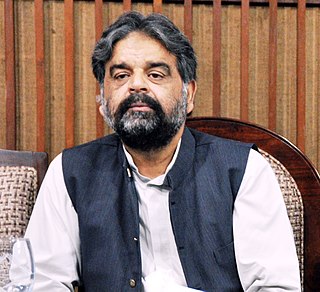
Sikandar Hayat Khan Bosan is a Pakistani politician who served as Minister for National Food Security and Research, in Abbasi cabinet from August 2017 to May 2018. He previously served as the Minister for National Food Security and Research in the Third Sharif ministry. Bosan previously held the cabinet portfolio of Minister for Food, Agriculture & Livestock from 2004 to 2007 during the Shaukat Aziz ministry.
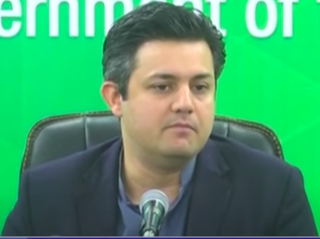
Muhammad Hammad Azhar is a Pakistani politician from Pakistan Tehreek-e-Insaf. He was elected from NA-126 (Lahore-IV) in 2018 Pakistani general election and remained a member of National Assembly of Pakistan between August 2018 to January 2023. He served in various ministerial positions in Imran Khan ministry between 2018 and April 2022. He served as Energy Minister of Pakistan and Finance Minister of Pakistan between 16 April 2021 to 3 April 2022 and 29 March 2021 to 16 April 2021 respectively.

The Imran Khan government was the federal cabinet of Pakistan from 20 August 2018 to 10 April 2022. It was formed by Imran Khan following general elections on 25 July 2018, which saw the Pakistan Tehreek-e-Insaaf come to power. The cabinet had 34 federal ministers, 7 ministers of state, 10 Advisers to the Prime Minister and 35 Special Assistants to the Prime Minister (SAPM), most of whom assumed office on 20 August 2018. The government was dissolved on 3 April 2022 following the dissolution of the National Assembly of Pakistan by the President, Arif Alvi at the behest of the Prime Minister, Imran Khan. On 7 April 2022, the Supreme Court of Pakistan ordered the restoration of the Federal Cabinet and National Assembly. On 10 April 2024 the government was defeated in a Vote of No-confidence (VONC) against Imran Khan, leading to its subsequent dissolution.















